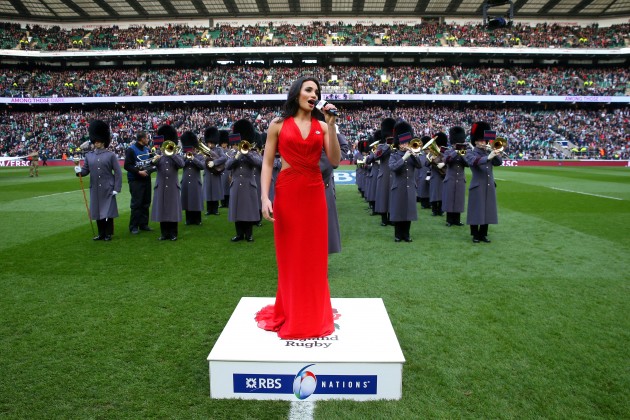We do multi-sport events quite well in this part of the world, as it turns out. Yes, Glasgow’s Commonwealth Games is doing a grand job of producing the same giddy euphoria that consumed London two summers ago. From Scottish judoka Euan Burton to retiring gymnast Frankie Jones via Australia’s para-swimmer Maddison Elliott, a plethora of varied personalities has absorbed spectators.
With Rod Stewart setting a gravelly tone at the opening ceremony, music is also proving a prominent part of proceedings. And not just because Anthony Bayne-Charles – son of 1980s R and B star Billy Ocean, no less – was in the Barbados sevens side.
Among the crowds, Neil Diamond ditty Sweet Caroline is the overwhelming track of choice. However, I’m more interested in what the athletes – specifically the successful English ones – have been greeted with.
Those lucky enough to top the podium have watched St. George’s Cross ascend to an instrumental of “Jerusalem”, William Blake’s poem originally orchestrated by Edward Elgar. That’s been the way since the Delhi Games four years ago. Prior to that, “Land of Hope and Glory” was played – another stirring Elgar tune. Both would be rousing enough to whip up a patriotic fervor as the official anthem prior to England’s rugby union Test matches.
So, should the RFU leave behind “God Save the Queen”? I don’t think it counts as treason to ask the question. Besides anything else, Twickenham’s current curtain-raiser is associated with Britain as a whole rather than England individually. But there are more pertinent arguments that bypass political agenda.
At any international venue, the anthem is a spectator’s opportunity to assert their influence upon the occasion – a unique, isolated chance to empty the lungs and fill silence with audible support. Every coach in the world preaches the importance of the first tackle, carry or kick in any given game. It’s a similar concept – the anthem is the crowd’s equivalent of that potentially momentum-grasping moment.
Skeptics might call it a trivial sideshow. That’s misguided. To borrow a term from cycling, professional sport is a business of marginal gains, psychological and physical. The presence in the England Rugby set-up of sports scientist Matt Parker – a former advisor to Sir Bradley Wiggins – is evidence that Stuart Lancaster agrees.
In any case, there are examples of anthems making an impact on England. Remember Croke Park in 2007? The home fans shook the GAA stadium to its foundations with a bloodthirsty pre-match battle cry, creating a tidal wave of Irish passion that swept away Brian Ashton’s charges and drove their side to a 23-3 half-time lead.
Sages have always said the Millennium Stadium aura is worth a few points, but the rendition of “Hen Wlad Fy Nhadau” in March 2013 hit a new level in terms of volume and feeling. Chris Robshaw’s intrepid charges shrunk into themselves, instilled with crippling doubt. A 30-3 defeat had a horrible air of inevitability about it from the first note.
Similarly, “Flower of Scotland” is a spiky leveler. “La Marseillaise” has stung even the most soporific French outfit into action. “Fratelli d’Italia” is bouncy enough to bring a swell of noise to opening exchanges in Rome.
Interestingly, the reason for England’s Commonwealth change before Delhi was a simple online poll. “Jerusalem” topped it with 52 per cent. “Land of Hope and Glory” registered 32 per cent, “God Save the Queen” just 12. Those first two are certainly exuberant, emotive pieces and could become a weapon if close on 80,000 voices belt them out. With a home World Cup around the corner, every advantage should be seized.
Having said all that, it’s unlikely the status quo will be altered. Prince Harry is a tireless, affable ambassador for the sport’s governing body in this country and the RFU is making strides anyway.
The “God Save the Queen” prior to England’s clashes against Ireland and Wales in the recent Six Nations were both extremely loud and foreshadowed fabulous atmospheres. From last season, official singer Laura Wright has swelled anticipation by singing “Jerusalem” about five minutes before the players have entered the fray.
This is not about accusing players of lacking pride – that would be ridiculous and immensely insulting. Lancaster has done a great deal of work with his current crop on identifying what Englishness means, which has been reflected in a series of honest, industrious performances from the start of 2012. Warriors such as Tom Youngs, Tom Wood and Owen Farrell would brim with whatever anthem was on the agenda. The same is true for just about every England representative before or since, from Brian Moore to Marland Yarde.
This is more about the environment. Twickenham may never be as intimidating as Cardiff. But heading towards 2015 and tournament-defining dates with Wales and Australia, there is huge incentive to Anglicise the setting as much as possible. If that requires a change of tune, why not consider it?






